How 12 activists and influencers — from Padma Lakshmi to Tarana Burke — define modern-day feminism
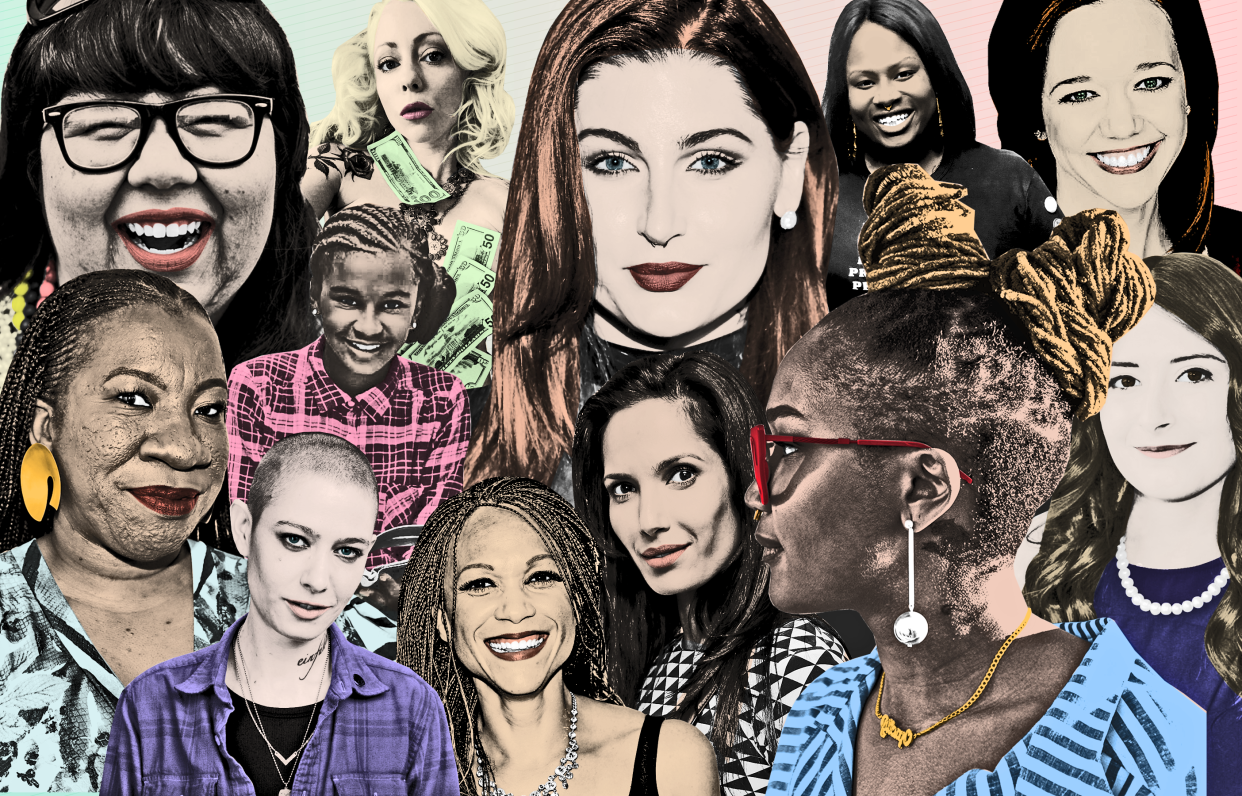
To mark the International Day of the Woman on March 8 and Women’s History Month, Yahoo Lifestyle is exploring notions of feminism and the women’s movement through a diverse series of profiles — from transgender activist Ashlee Marie Preston to conservative campus leader Karin Agness Lips — that aim to reach across many aisles.
Yahoo Lifestyle was lucky enough to spend much of Women’s History Month speaking with some amazing individuals — activists, mothers, actors, and influencers among them. And one thing we asked them all is about the term feminism — what it means to them, and if there is room for more than one definition within the context of today’s women’s movement. Here’s what 12 game-changers had to say.
Padma Lakshmi, Top Chef host
“I don’t think there’s room, actually, for more than one definition. I think there’s one definition and it’s very plain: If you’re a feminist, you believe that all people, including women — half the population — deserve to be treated equally. We deserve equality under the law, in our culture, in our marriages, as parents, and as professionals. We have a long way to go. We’ve come some way, but we have a long, long way to go. … But if you believe that everybody deserves the same rights, then you’re a feminist. It’s that simple. It’s not hating men; it has nothing to do with that. I love men — I love men — I love women, I wear bikinis, I wear lipstick, I have a lot of lipstick, I wear high heels, I am a feminist. I don’t think that I could love someone who wasn’t a feminist, because I wouldn’t respect them. Because I would feel like they don’t respect me. Because if you say, ‘I’m not a feminist,’ then that means you’re bigoted in some way — that you think I’m less because of my gender, or that I deserve less than someone who’s a man. And I think that person is crazy.”
Asia Kate Dillon, Billions and Orange Is the New Black actor
“Feminism feels to me like an acknowledgment of the ‘fem’ … the fem-ness — the feminine energy as just as powerful and integral toward life as masculine energy, and the idea that everything that we’ve been taught, traditionally, about the ways in which feminine energy is somehow less than or weaker or not as capable. It’s just about subverting all those ideas and saying, actually, we all are capable of experiencing the feminine and the masculine but also the investigation of what those words actually mean – what is feminine? What is masculine? Other than the traditions of a social contract that was created before we were born — that we never signed — that we’re asked to adhere to.”
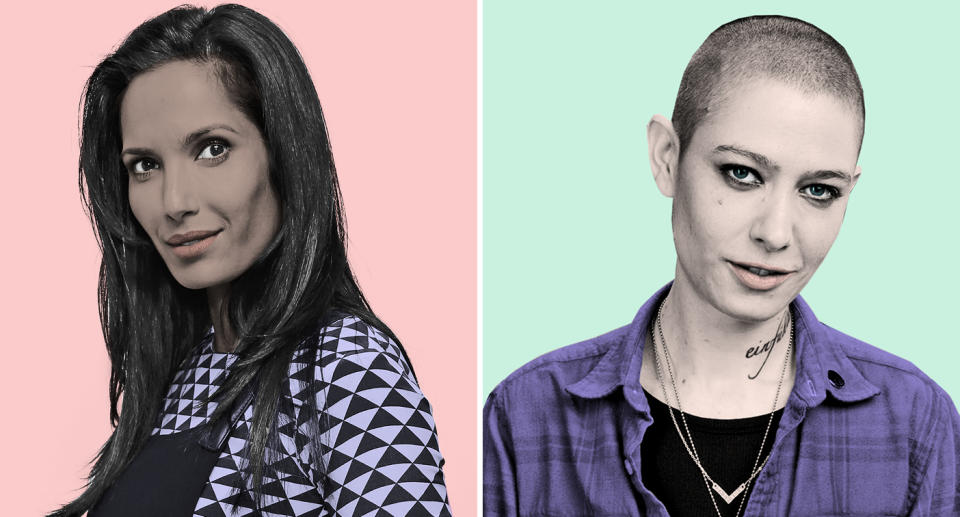
Tamika Mallory, Women’s March cofounder
“I’m still trying to figure out what feminism is to me. There are broad definitions that have been historically used to describe the term, but I’m still working to define it for me and my generation, because the word itself — yes, it is a word — I believe has manifested itself in a real movement. It’s a breathing and living thing, and in order for that to be so, it has to actually represent the issues and concerns that I carry with me, and that is not always so. Some folks who claim feminism may not be concerned with the things that matter to me. But then there are other people who claim feminism, and they are part of the body of people who are interested in how black and brown people are impacted by oppression and other very significant issues. So it does have different meanings for different people. But how it manifests itself collectively is something I think we, specifically Women’s March, are still trying to define and still trying to figure out.”
Trace Lysette, transgender activist and Transparent actor
“I think that the key, going forward, is intersectional feminism —inclusionary feminism versus conservative old-school feminism, or white elitist feminism. Being a feminist is to be compassionate, and compassion doesn’t stop at just cis white women — it should permeate into all different walks of humanity. If you’re not with that, you’re going to get left behind.”
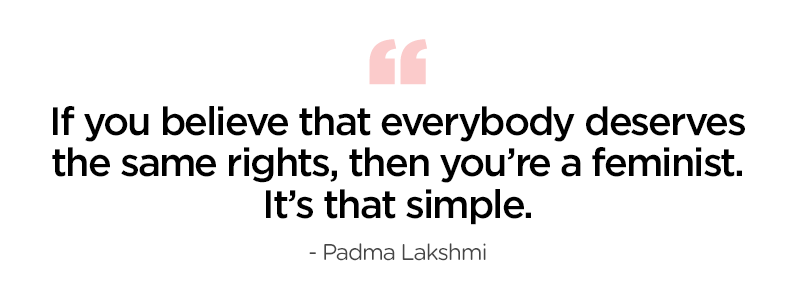
Marley Dias, 13-year-old author and activist, head of #1000BlackGirlBooks campaign
“I believe that feminism needs to teach more girls about how to make institutional changes and how to further engage men and boys into being our allies. … I don’t see my generation at the forefront [of #MeToo and Time’s Up], the way older women are. I don’t see where they are making a place for us to continue, refine, and expand the work they have started. Young girls like me may not understand all the issues, but we are the ones who will be left to deal with anything they have not dealt with; we must be taken seriously.”
Melissa Harris Perry, professor and former MSNBC commentator
“For me feminism is a question, and the question is: What truths are missing here? So it is not a particular set of policy prescriptions or position on any set of ideas; it’s a question that we’re asking ourselves all the time. We are always limited in our own understandings, and so no matter how woke you are, you’re always asleep to something else. We have some blind spots in our periphery. [I remind my students] that they should probably not eliminate everybody that asks a stupid-ass question in class, because … just because they don’t have all their truths doesn’t mean that they’re not on the path to them. So just keep asking, as feminists: What truth is missing?”
Lorelei Lee, sex worker and activist
“For me, feminism means recognizing that misogynist underside of so many of the systems in which we live. But it also means recognizing the ways that misogyny intersects with other forms of oppression. So I think that a definition of feminism that isn’t intersectional, to use a frequently misunderstood word, is a failed definition of feminism. I think it fails to uphold the ideal that it pretends to support. If you claim to agree with gender equality, you can’t actually uphold that without recognizing the ways that gender discrimination intersects with so many other forms of discrimination. Obviously, two of the very big areas in which that happens is exclusion of sex workers and exclusion of transgender people from feminist discourse.”
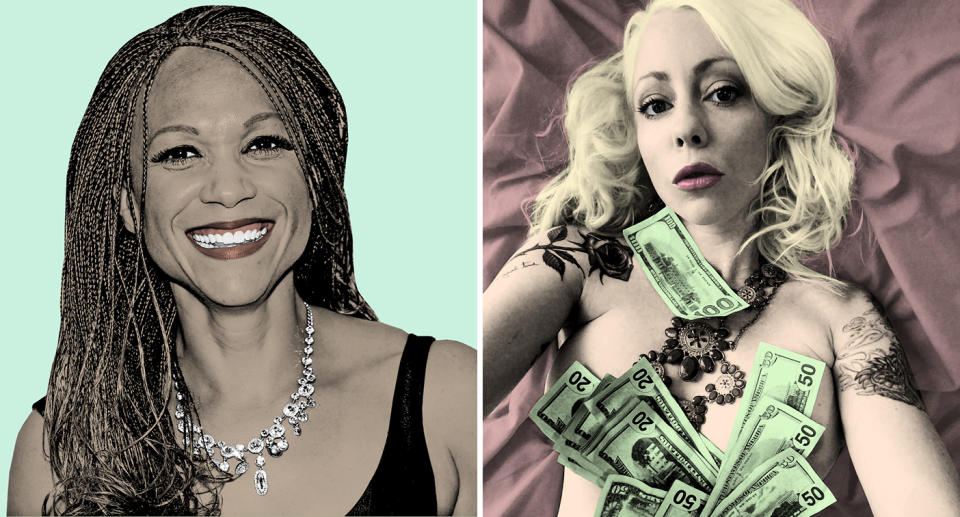
Kimberly Drew, Metropolitan Museum of Art social media manager and “Museum Mammy”
“For so many people, it can mean so many exclusionary things, and it is a term/phrase that needs to be constantly interrogated. It’s maturing every day. Every year we are learning new ways in which there is a hole in it and we’ve got to fix it and not just put a Band-Aid on it. … It’s not perfect. It will never be perfect, but it doesn’t have to hurt. We have to keep flexible and in flux because all of these identities are constantly on a spectrum and all of these oppressions are constantly on a spectrum — there are always new ways in which people get cut out.”
Kassy Dillon, founder of the Lone Conservative
“It’s supposed to mean equality and helping women get to a status where they’re equal. In modern day terms, it’s changed, or the connotation has changed, where there’s this standard for the feminist movement and what you must believe. I don’t like the term feminism. Women are not a monolith and have different viewpoints.”

Ashlee Marie Preston, writer and activist, Revry host
“I would say, ultimately, that feminism that doesn’t acknowledge the experiences of women of color, immigrant women, disabled women, or trans women is faux feminism. Sometimes we forget that there are identities that carry more privilege within the women’s movement, and often what happens is the experiences of women of color and trans women tend to be put to the back, and there’s a lot of myopia. And any time you don’t consider the experiences of all women, it’s coming from a self-serving place. … I feel that it’s impossible to be an ultraconservative feminist, because you’re supporting people that are working against your own interests. So when I see white women who are Trump supporters, who say they’re feminists, it blows my mind. … Feminism is about improving the quality of life for all women. And if you’re not actively dismantling racism, or discrimination based on class and economic position, then you are part of the problem — and you’re benefiting fromm the oppression of other women. Therefore, you cannot be a feminist.”
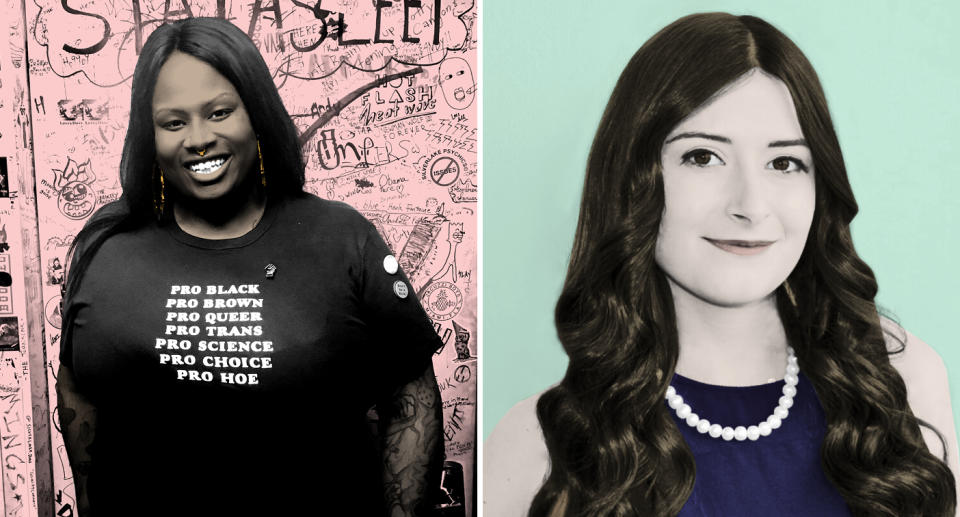
Karin Agness Lips, founder of the Network for Enlightened Women and the Independent Women’s Forum
“Right now, one of the problems with feminism is that it lacks a universally agreed-upon meaning. If you would gather a group of leaders in the women’s empowerment movement, the definition would vary dramatically. The problem with modern-day feminism is that it lacks that universally agreed-upon definition, and it’s been co-opted by political liberals and progressives as a vehicle to pass their political agenda. The feminism I’d love to talk about is opportunity feminism, which seeks to maximize women’s opportunities to build the fulfilling and meaningful lives they want to build. When I speak on campuses, I talk about opportunity feminism focusing on the opportunities our policies should be promoting.”
Tarana Burke, Just Be Inc. activist and #MeToo creator
There’s always room. I never try to tell people anything that personally impacts their lives. Right? For me, it is about gender equity, and it’s just about us having the same things as men. Because I think there are things that exist in the world that are associated with men that are just toxic in general. For instance, when people talk about pay equity, we’re really talking about white women having the same amount of pay as white men. When pay equity happens, what happens to the women of color? Pay equality rather. But when you talk about equity, you’re talking about an equitable distribution of resources and things like that and so my feminism is a feminism that reaches all of the marginalized communities, includes all of their voices and centers on their needs, which is hard because it’s a lot of different needs from a lot of different people. But my feminism is one that is committed to that work. That’s how I look at it. I try to work from that gaze.”
Virgie Tovar, author and body-positive activist and influencer
“For me, it’s fundamentally about the belief that every single woman has the right to thrive, and that’s a different definition for every single person. Like, for me, my right to thrive is my right to have sex whenever and with whomever I want, to have relationships on the terms that work for both of us, and for me to be able to sit by a pool and have a Chihuahua and speak my mind without cultural repercussions. It means the right to actually do the things that authentically nourish me, and for the culture to support — or at least not actively hinder — that endeavor. We’re living in a reality in which women’s right to thrive and women’s right to freedom are deeply hindered by patriarchy, and there’s not an active investment in women in our culture right now. What we see is a woman is more likely to be sexually assaulted than to live a life on her own terms, that’s the reality … as for conservative women, if you are actively exercising politics and voting on politics that hinder women’s autonomy, you are not a feminist. It’s just that simple.”
Read more from Yahoo Lifestyle:
March for Our Lives and gay activism: ‘They’re definitely linked for me,’ says Emma González
The most pressing question of Women’s History Month: What is feminism in 2018?
Follow us on Instagram, Facebook, and Twitter for nonstop inspiration delivered fresh to your feed, every day.

